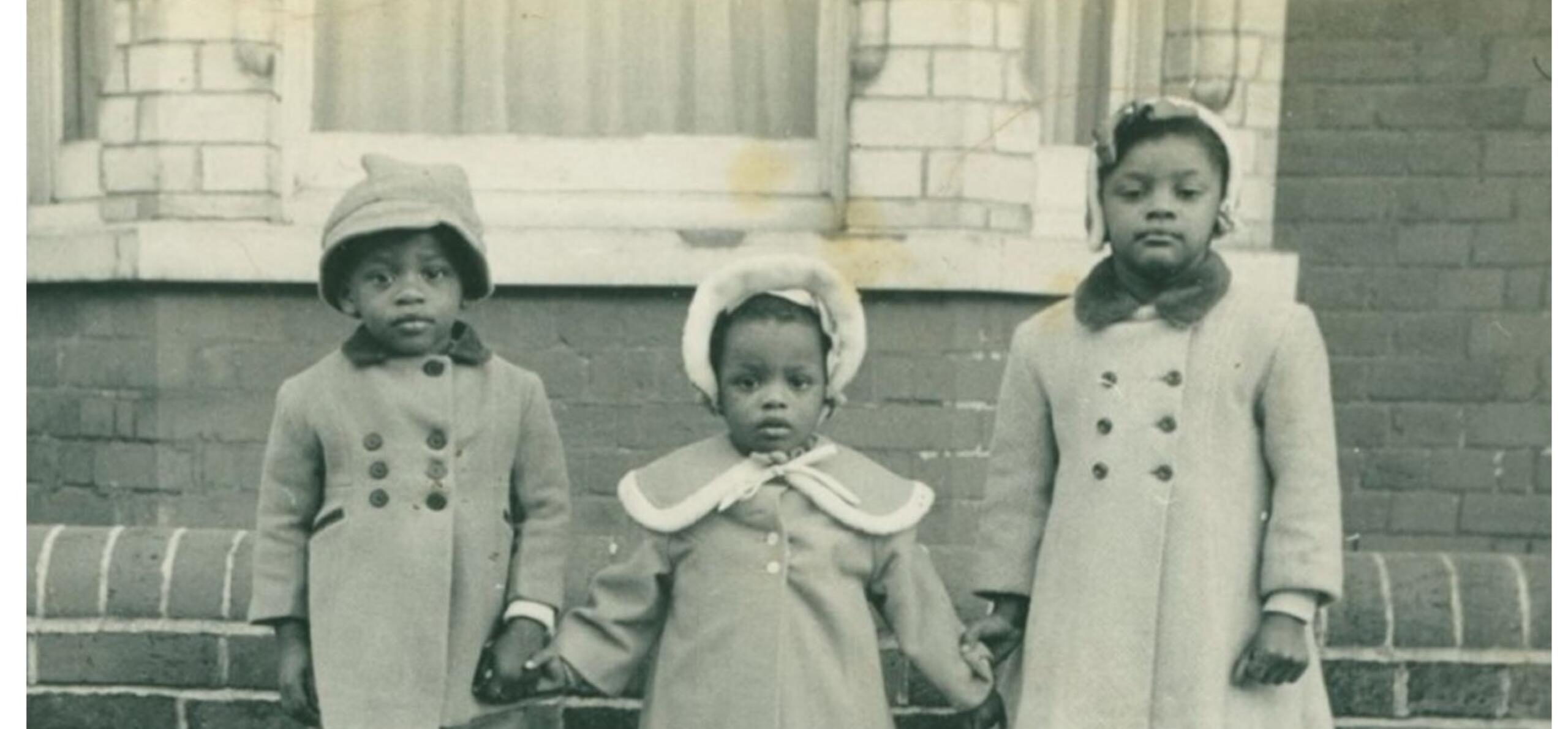Migrant Families
Roy and his wife had left their two children in Barbados when they returned to England … but the separation was traumatic for the parents, and Roy had difficulty talking about it.
- Roy Campbell, oral history
Most migrants travelled to the UK alone in order to create a home and build a life, until they were able to bring over their other family members to England. However some travelled with members of their families, while others travelled to reconnect with family members who had already migrated. The experiences for each family differed, for some it was a lot harsher than they expected it to be, while for others it opened a new chapter in their lives.
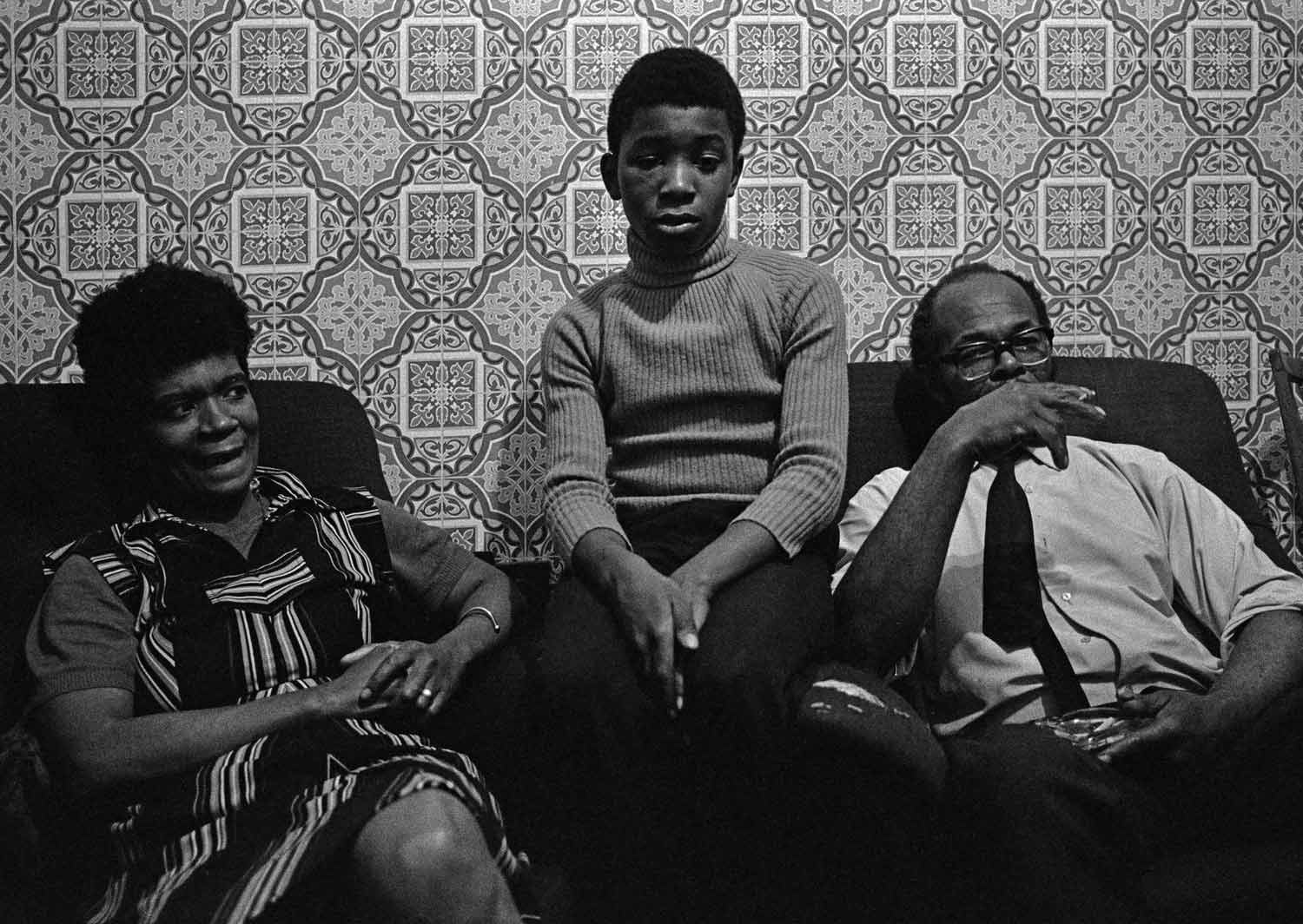
The Fosters, Lewisham by Syd Shelton
Many of the migrants left their children back home to be raised by relatives until they were able to send for them. In certain instances, women brought their children along with them and tried to manage their family life along with their work life.
Women who brought their children with them often faced challenges arranging care for their children while they were at work. Consequently they sometimes sent them back home to live with relatives. A few were lucky and found other Caribbean women who offered to look after their children. This system made it a lot easier on some of these mothers to handle their new life experiences.
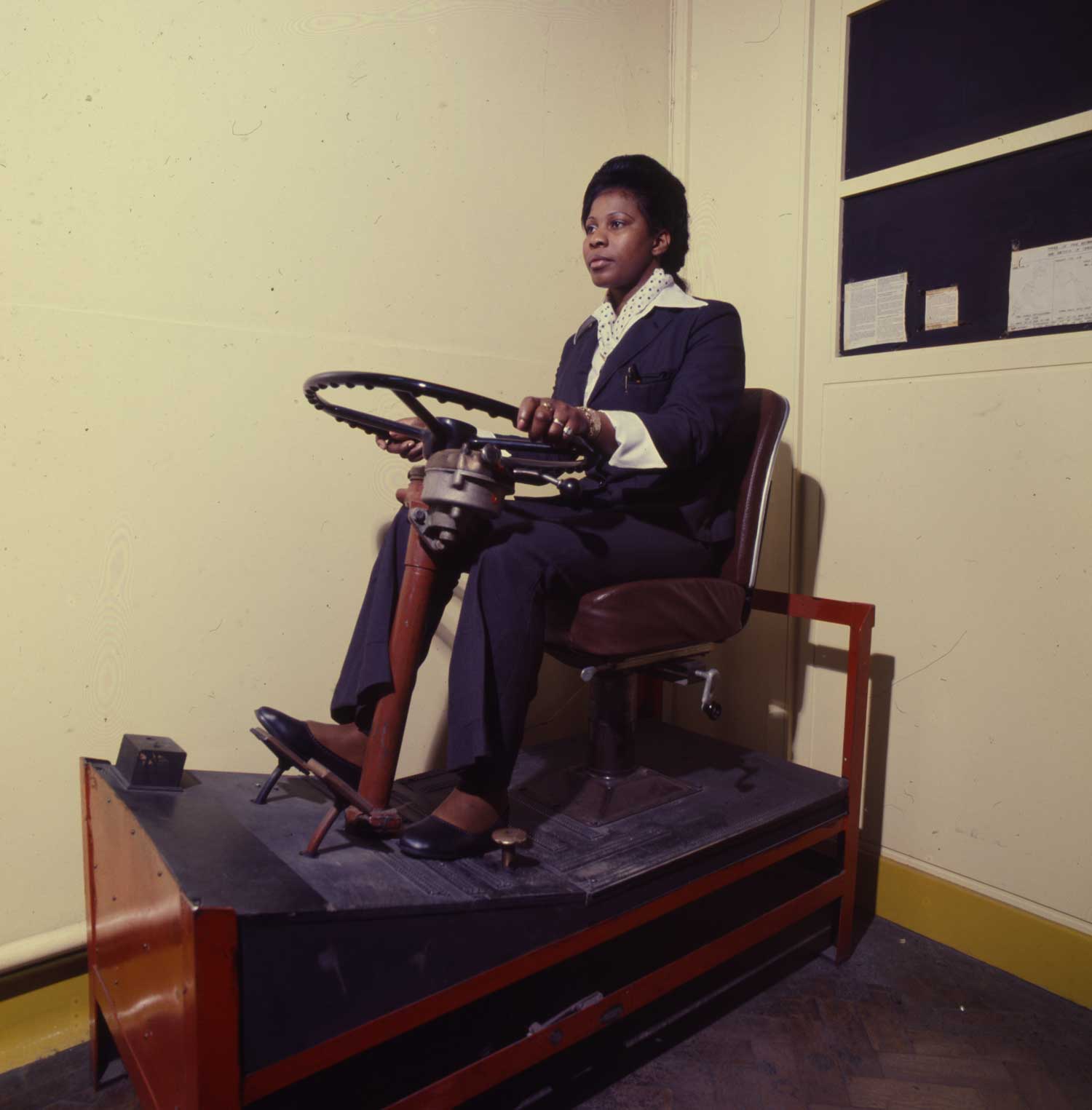
Female bus driver training at Chiswick Works, 1975 © TfL from the London Transport Museum collection
I Had No Choice in the Matter...
It was quite a devastating experience. I was 13 when I arrived so I wasn’t a man, I was a boy. Most of the people on the Windrush were men.
- Generations – Celebrating 50 years of Caribbean Recruitment, Vince Reid
The experiences of children were quite different according to their age at the time when their parents decided to migrate. Some children migrated as young as five years or earlier. The memories that these children had of their parents could be therefore quite confusing for them. For older migrant children, the experience often left them overwhelmed and upset, as they felt that they were forced to migrate.
To be uprooted from the only home they knew in the West Indies to move to a new country was a major adjustment.
The move from a small community where they had a sense of security to a new much larger area in the UK where they no longer enjoyed the same freedoms of home left many children feeling anxious and pressured. Unlike back home in the Caribbean, the streets of Britain were not as safe for them - they had moved from what some might describe as a comfortable living existence, to cramped and tightly constrained urban living conditions. In addition, they left behind relatives in the Caribbean who had cared for them and whom they loved – grandmothers, in particular.
These children often had few or no friends for long periods of time because of the hostility and abusive attitude of the host community and the blatant racism they experienced. Not only did these children experience hardship in their living conditions but they often faced a variety of prejudices within the education system and later, in employment and training as well which led to them being disadvantaged.
Family reunions could sometimes be very difficult, as children left in the Caribbean were brought to join parents they could hardly remember, and sometimes siblings born in the UK that they had never met.
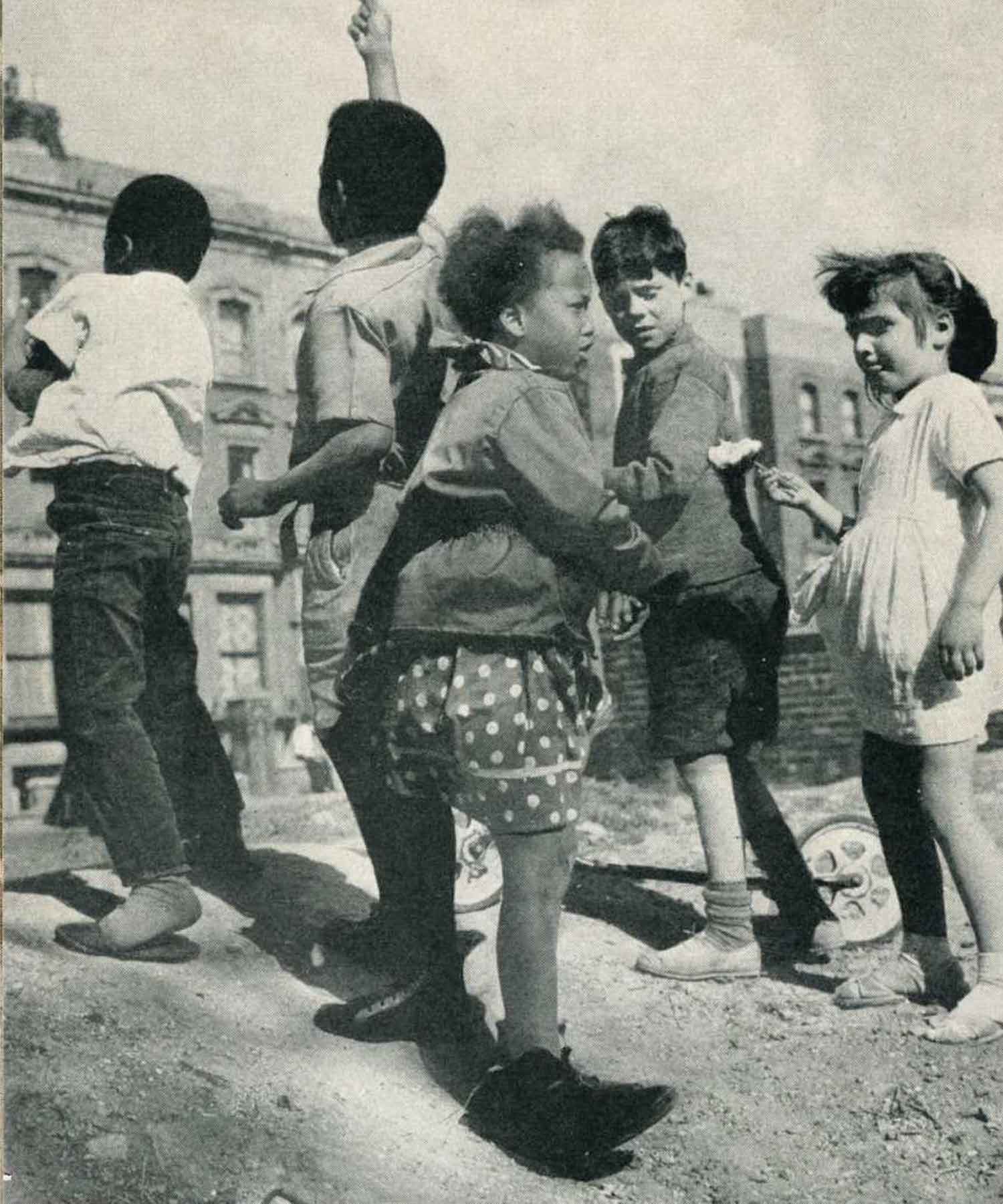
Children playing on bomb site © BBC copyright content reproduced courtesy of the British Broadcasting Corporation. All rights reserved.
Barrel Children
Michael Joseph would know his mother not from the smell of boiling milk, a whispered song or bare black feet but from the remembered taste of salt tears. Those tears that on that day dripped, one at a time, from her eye, over his lips and on to his tongue…
- Small Island, Andrea Levy
Often parents migrated to the UK and left their children behind to be cared for by other relatives with the hope of reuniting with their children at a later date. This was done to ensure that their children would experience a better life they had. Some children grew up without actually knowing their parents or not remembering them.
The children that were left behind came to be known as “barrel children” – a term coined in Jamaica in the 1990s to describe the much earlier phenomenon in reference to the barrels that they (and the families left behind) depended on for survival, that their parents would send back home to help with the care and upkeep. Some children were left at very early ages - some as young as toddlers - and were often excited to see what came home for them from England when their parents sent the barrels. However, as they began to grow older their feelings of excitement began to wane, and were replaced with feelings of hope or discontentment, which were mostly fueled by relatives who were jealous of those who had managed to migrate.
Some of these children also began to have expectations of their parents who were abroad, and became disappointed when they asked for certain items which their parents were unable to provide; some even went so far as to become visibly upset when they did not get what they asked for. The communication or contact between the parents who migrated and their children was often very poor and limited thus leaving the children to feel very left out and become angry at their parents for leaving them behind.

Fiber Drums
Are They Here Legally? [1]
I realized at that moment that I was British, but evidently not a Briton, and that fine differentiation was now very important.
- ― To Sir, With Love, E.R. Braithwaite
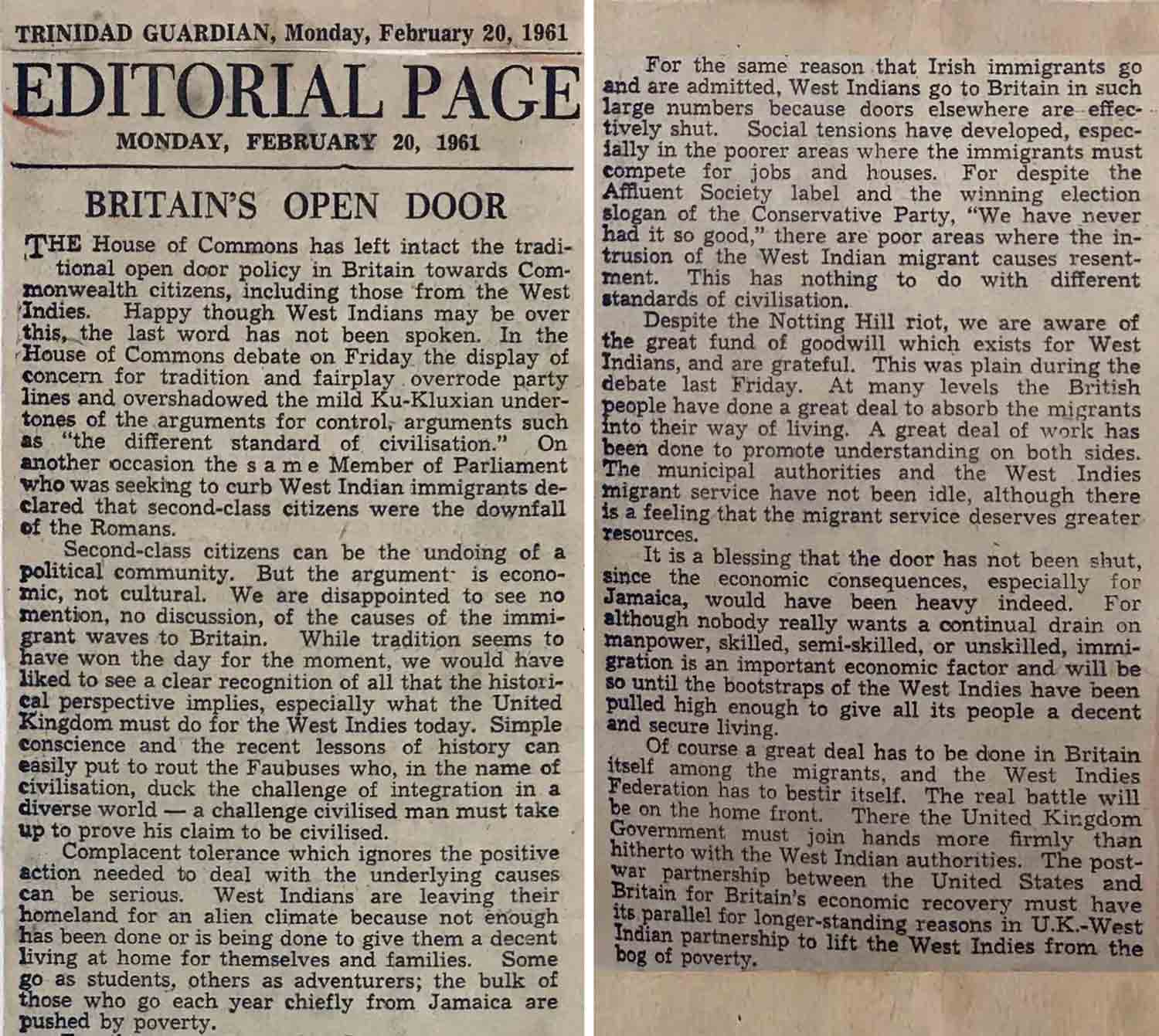
Trinidad Guardian 1961 cutting (WIFAC Collection)
Immigration policy in the UK for Commonwealth citizens has been a roller-coaster ride from the beginning. From 1948 - when the British Nationality Act was passed which granted citizenship “of the United Kingdom and its colonies” on all Commonwealth countries - until now, citizenship has been questioned.
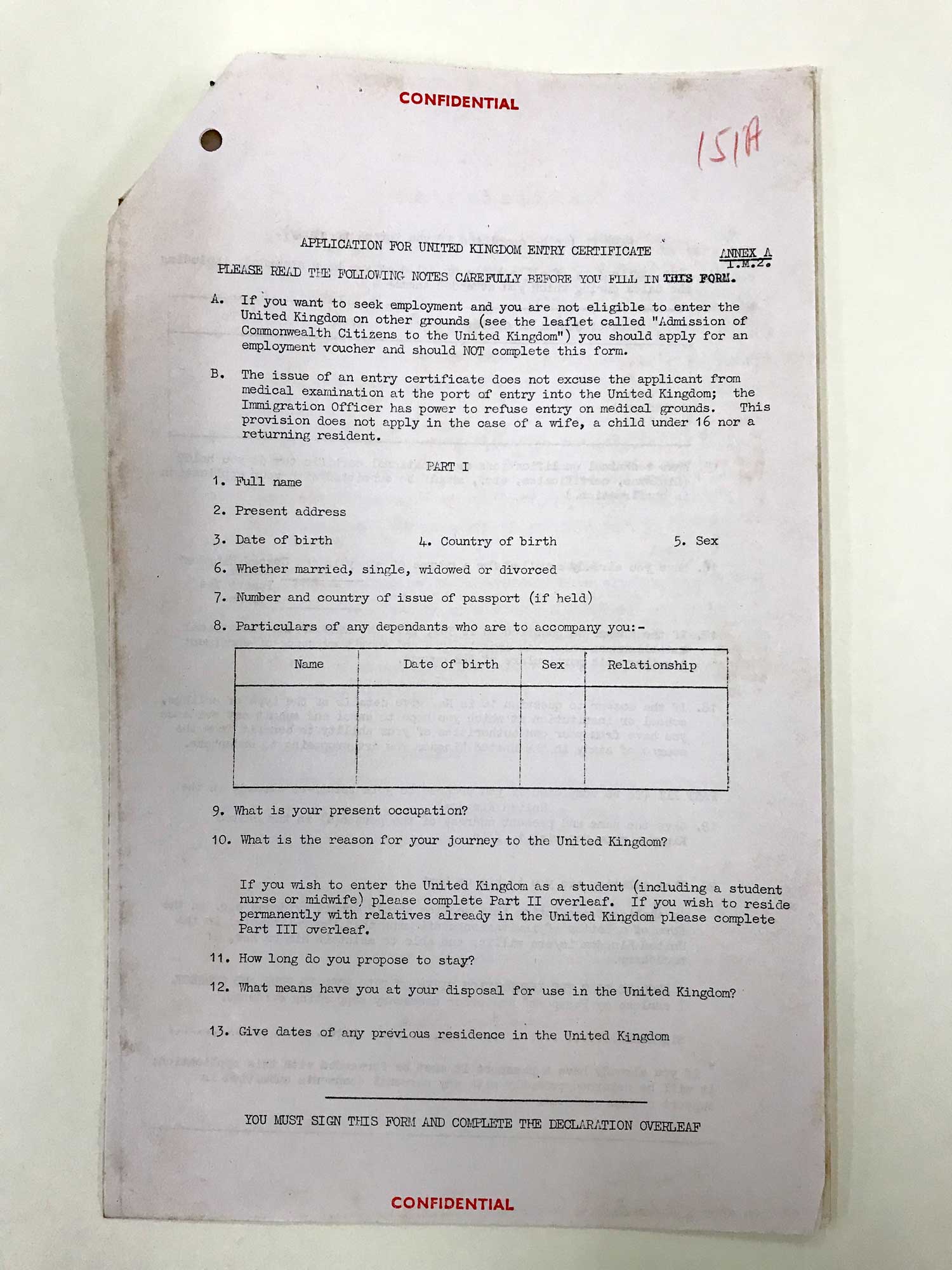
Application for UK Entry Certificate (WIFAC Collection)
In Parliament, the colonial secretary, Arthur Creech Jones, is reputed to have remarked “…these people have British passports and they must be allowed to land.” Before adding “Don't worry, they won't last one winter in England” - a statement which makes a clear illustration of the prevailing sentiments of the British. (Sam King, arrival on Windrush)
This Act has been amended several times in the intervening years, with changes in of 1962, 1968 and 1971. However, it was the amendment in 1971 which changed the law granting only temporary residence to most new arrivals, but still allowed people who arrived before the Act came into force on January 1, 1973, to remain in the UK indefinitely. However they needed to register. Further amendments were made in 1981 to provide an updated British Nationality Act which contained new provisions for citizenship based not on historic ties to the Commonwealth, but on birth in Great Britain.
All of these Acts slowly eroded the legality, rights and citizenship status of many Caribbean immigrants who had travelled to the UK during the ‘Windrush’ era that was established by the British Nationality Act of 1948.
In 2010 the then Home Secretary Theresa May launched her “hostile environment”, a vote-winning policy to curb the entry into Britain of what were termed ‘bogus asylum seekers’ and ‘illegal immigrants.’ Under the policy, anyone suspected of being an illegal immigrant had to prove their legal right to remain, or, for those born in the UK, the legal right of their parents to remain, rights that, for Caribbean and other “new” Commonwealth peoples, predated the 1971 legislation. The enactment of the Immigration Act of 2014, introduced requirements designed to restrict illegal immigrants' access to obtaining employment and accessing social services such as healthcare, benefits, and housing.
Immigration checks flagged up many Commonwealth immigrants of Caribbean descent as illegal even after years of living in the UK, working and paying taxes. They lost their jobs, homes, and the ability to collect benefits and access healthcare. Some people have been forcibly deported back to countries that they have not seen or lived in for decades. Forcible deportation has caused families to be broken up and other immigrants to live in fear of the possibility of being deported.
Further, since the Home Office did not keep proper records, or the records that they had were destroyed, it has been difficult for immigrants from the Windrush period to prove that they are in the UK legally. The onus to prove that they were in the UK legally before the 1971 Immigration Act came into force in 1973 has fallen on these individuals who have been required to provide four pieces of evidence for each year of residency, despite the paper trail they have left with paying National Insurance, taxes and such.
Many of these problems were the result of a clause from the 1999 Immigration and Asylum legislation, which had provided long-standing Commonwealth residents with protection from enforced removal, deleted from the 2014 Immigration Act. They continue on today, as there has been no certain fix or attempt to reinstate the clause in order to solve the problems that have resulted.
[1] BBC News “Windrush generation: Who are they and why are they facing problems?” April 18th 2018.
Watch Windrush: 'Fighting to prove I'm British' - BBC Newsnight
Repatriation
They knew that Jamaica produced sugar, rum and bananas, that Nigeria produced cocoa, and that British Guiana had large natural resources; but these names, though as familiar as the products with which they were associated, were of places far away, and no one seemed really interested in knowing anything about the peoples who lived there or their struggles towards political and economic betterment.
- ― To Sir, With Love, E.R. Braithwaite
The first time that West Indians were repatriated happened after their initial period of service to Britain during World War I. After serving as part of the British forces, West Indian servicemen were ‘demobbed’ (demobilised) and sent back to their home countries. This process was repeated again at the end of World War II. In both cases, repatriation was not necessarily a voluntary choice for those West Indians many of whom were not keen to return to the conditions that they had left at home when they signed up to be part of the British Armed forces. They had seen a different lifestyle and were determined to move on and move up.
The next time that repatriation was spoken about in this way was when Minister Enoch Powell encouraged Britain to repatriate the same West Indian migrants which he had himself helped recruit in order to deal with what he believed would be an overwhelming migratory movement to the UK. Although Powell’s proposal had populist support, it also had opposition – in parliament, from Caribbean peoples, from progressive white British people and from Caribbean governments who had become used to the inflow of remittances, economic returns from Caribbean people residing in Britain, as well as the safety valve provided in the labour market at home due their labour surplus migrating to Britain.
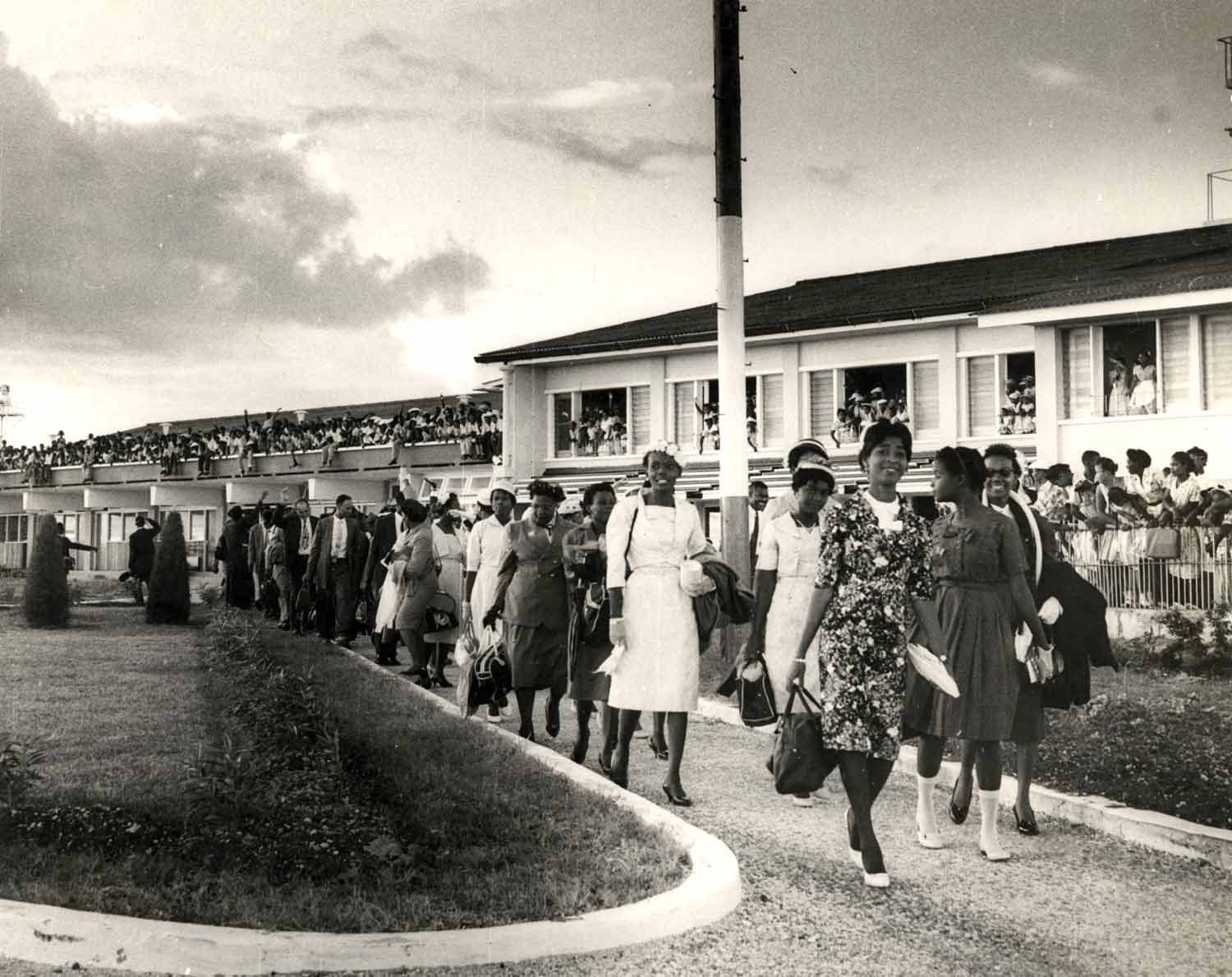
Cotton Workers for Lancashire and Railway Workers Leaving Terminal Building at Seawell, Courtesy of Barbados Government Information Services
Moving Away from the UK
I did my Masters degree here, intending to stay for only two years, and it captured me, and I just decided to stay. It’s a lot easier for me to stay here, living in New Zealand. I was on this bus, and it was just full of brown people, Pacific Islanders, Maori, me, and nobody asked me where I came from, nobody stared at me, so I sort of merged into the background which was the first time I felt at home.
- – Rachel, oral history
Some first and second generation Caribbean migrants to Britain have left the UK but have not returned to the Caribbean, instead moving onto other commonwealth countries such as New Zealand, Australia and Canada. Countries like New Zealand have large indigenous populations and as such multiculturalism has been central to policy and everyday life in the country, so for some, moving there provided considerable relief from a lifetime of racism they had experienced in Britain.
For example, once settled, in New Zealand, they strongly identified as Caribbean rather than British, even if they had never lived in the Caribbean country of their heritage, forming community groups to express their culture and connect with people of Caribbean heritage from all over the world. Even more recently, these cultural traditions have been held by their own children, who, born and raised in New Zealand to parents born and raised in the UK, would identify as being from the Caribbean.
Watch The Caribbean in New Zealand: A Sample of Migration Stories
